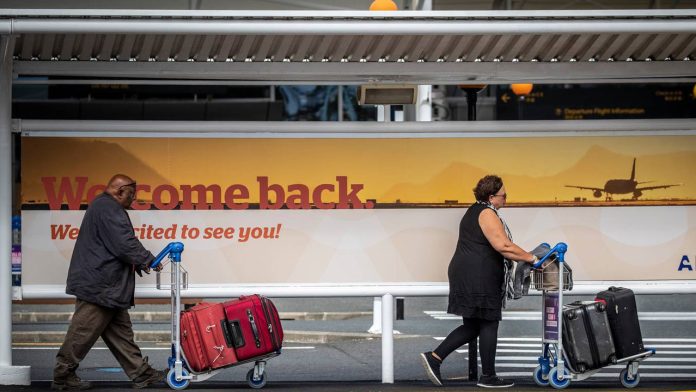As of next Tuesday, people travelling to New Zealand will no longer need a negative pre-departure test.
Covid-19 Response Minister Ayesha Verrall said the Government had “taken a careful and staged approach to reopening our borders to ensure we aren’t overwhelmed with an influx of Covid-19 cases. Our strategy has worked and as a result it’s safe to lift pre-departure test requirements much sooner than planned.
“I’m advised the challenges pre-departure tests pose to visitors are now no longer outweighed by the public health benefits,” she said.
The current rule means people coming to New Zealand by air must get a negative PCR, RAT or Lamp test 24-48 hours before departing on the flight to New Zealand depending on the type of test.
Pre-departure testing is one of the last border restrictions still in place. It is not the last however: even when pre-departure testing is gone, non-citizens and non-residents will still require proof of vaccination to travel here.
New Zealand is one of a diminishing number of countries to have pre-departure tests and tourism operators had voiced concerns that testing was putting travellers off.
The Government is also concerned it will become more difficult to get pre-departure tests as more and more countries drop them as requirements for travel. The United States dropped its pre-departure testing requirement on Sunday.
Prime Minister Jacinda Ardern had said the tests would be gone by 31 July at the latest, but the Government’s increased confidence in the Covid outlook has meant this date could be brought forward.
“While we are still working through this transition, it’s fair to say we are confident that pre-departure testing will be removed by the time we come to the final phase of our reopening in July,” Ardern said earlier this year.
The timing will also allow the border to be more fully open for the ski season and Australia’s coming school holidays.”
The final phase of border reopening will occur on 11.59pm on 31 July, when all vaccinated travellers and students will be able to enter New Zealand, provided they have a visa.
People who arrive in New Zealand are also given a pack of RATS to do after arrival. About 90 percent of people are completing these tests and 2-3 per cent are reporting a positive result.
The Government does not see this changing significantly after the requirements are dropped.
Verrall also announced three other changes.
“Also from Monday evening, passengers transiting through New Zealand will no longer need to be vaccinated, nor be required to complete a New Zealand Traveller Declaration,” Verrall said.
“Travellers with COVID-19 like symptoms (e.g. Hayfever) will also be able to choose between showing a negative COVID test, or a certificate from a health professional ― stating that they are unlikely to have COVID-19 ― before travelling.
“Another change will see the maximum penalty for breaching the Air Border Order’s vaccination requirement reduced from $4,000, to $1,000 (US$2,510 – US$627),” she said.
National has been calling for pre-departure testing to go. Earlier this week, the party’s Covid-19 response spokesman Chris Bishop said the tests should be dropped.
2The world is moving on, but New Zealand insists that anyone coming here must present a negative test before getting on a plane,” Bishop said.
“Pre-departure tests made sense when we were pursuing elimination. But they make zero sense when we already have thousands of cases a day at home,” he said.
This morning, Bishop welcomed the move saying it was “a good step forward”.
Act leader David Seymour has also been pushing for a change, and advocated for it to be dropped.
Earlier this month, he told the House the tests were making little difference.
“Why don’t we just dump it?” he said.
Covid cases continue to level off after a peak earlier in the year. Another peak is expected later in the year, but the Government does not expect this to be impacted by changes at the border.
Hospitalisations with Covid-19 are also levelling off. The seven-day average of people in hospital with or due to the virus was 362, down from over 900 during the peak earlier this year.
The Government does not believe dropping pre-departure testing will lead to a surge of domestic infection.
SOURCE: NZ HERALD/PACNEWS













